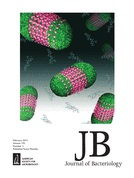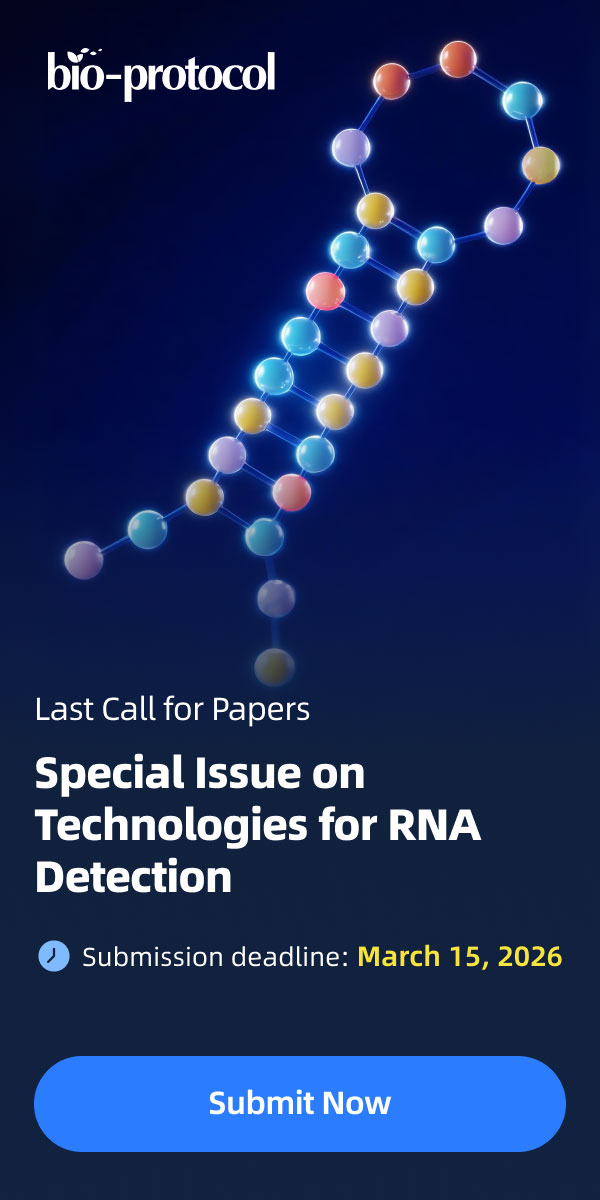- Submit a Protocol
- Receive Our Alerts
- Log in
- /
- Sign up
- My Bio Page
- Edit My Profile
- Change Password
- Log Out
- EN
- EN - English
- CN - 中文
- Protocols
- Articles and Issues
- For Authors
- About
- Become a Reviewer
- EN - English
- CN - 中文
- Home
- Protocols
- Articles and Issues
- For Authors
- About
- Become a Reviewer
Choline Uptake Assay in Bacterial Cells
Published: Vol 3, Iss 18, Sep 20, 2013 DOI: 10.21769/BioProtoc.902 Views: 10861
Reviewed by: Fanglian He

Protocol Collections
Comprehensive collections of detailed, peer-reviewed protocols focusing on specific topics
Related protocols

Measurement of Proton-driven Antiport in Escherichia coli
Scarlett R. Holdsworth and Christopher J. Law
Nov 5, 2014 9840 Views

Determination of Mn Concentrations in Synechocystis sp. PCC6803 Using ICP-MS
Fabian Brandenburg [...] Marion Eisenhut
Dec 5, 2017 8593 Views

Quantification of Hydrogen Sulfide and Cysteine Excreted by Bacterial Cells
Sergey Korshunov and James A. Imlay
May 20, 2018 7137 Views
Abstract
Choline is a methylated nitrogen compound that is widespread in nature. It is a precursor of several metabolites that perform numerous biological functions and it is predominantly used for the synthesis of essential lipid components of the cell membranes. Since there is no evidence that prokariotes can synthesize choline de novo and because choline uptake from exogenous sources is energetically more favorable than de novo synthesis, bacteria have evolved different uptake mechanisms for choline transport across the bacterial membrane. This protocol describes an easy and high sensitive method to assess choline uptake in bacteria using as tracer [3H]-choline chloride. The protocol was originally intended for Brucella abortus but could be applied for any bacteria with the corresponding modifications depending on the bacteria growth requirements (composition of the culture medium, temperature for growth, etc.). It can be useful to determine the choline uptake ability of several bacterial species under different growth conditions.
Keywords: CholineMaterials and Reagents
- Brucella abortus or the bacteria species you want to test
- Minimal medium (MM) such as M9 or equivalent
In the case of Brucella abortus we use Gerhardt-Wilson (GW) minimum medium (Gerhardt, 1958)
- Choline Chloride ([Methyl-3H]-, 250 μCi (9.25 MBq)) (PerkingElmer, catalog number: NET109250UC )
- [3H]-choline/cold choline chloride (1:100)
- Liquid Scintillation (liquid Optiphase HISAFE 3) (PerkingElmer, catalog number: 1200-437 )
Equipment
- Microplate reader or Spectrophotometer
- Liquid scintillation spectrometer (Gemini BV, model: WinSpectralTM 1414)
Procedure
- For radioactive choline uptake analyses, cultures of bacteria grown in an appropriate minimal medium (MM) at mid log phase were harvested, washed three times with ice-chilled MM and adjusted to an optical density at 600 nm (OD600) of 0.5 with fresh MM.
Note: Bacterial culture is harvested at OD600= 1-1.2 that correspond to a mid log phase for Brucella under this growth conditions.
- Reactions were initiated by addition of [3H]-choline chloride (80.6 Ci/mmol) to a final concentration of 3.3 μM, incubated at 37 °C and aliquots (around 300 μl) were taken at different time points (0 to 30 min).
- Samples were immediately chilled on ice, washed five times with the same volume of ice-chilled MM, centrifuged at 10,000 x g, 15 min at 4 °C and cell pellets were resuspended in 500 μl of scintillation liquid.
- The radioactivity in the cell pellet was determined with a liquid scintillation spectrometer.
- To assess uptake kinetics at different choline concentrations, bacteria were incubated 7 min at 37 °C in MM with a mix of [3H]-choline/cold choline (1:100) ranging from 6.25 x 10-2 μM to 64 μM (total choline concentration) and incorporated radioactivity in the cell pellet was determined as describe above.
Acknowledgments
This protocol was adapted from Herrmann et al. (2013).
References
- Gerhardt, P. (1958). The nutrition of brucellae. Bacteriol Rev 22(2):81-98.
- Herrmann, C. K., Bukata, L., Melli, L., Marchesini, M. I., Caramelo, J. J. and Comerci, D. J. (2013). Identification and characterization of a high-affinity choline uptake system of Brucella abortus. J Bacteriol 195(3): 493-501.
Article Information
Copyright
© 2013 The Authors; exclusive licensee Bio-protocol LLC.
How to cite
Bukata, L., Herrmann, C. K. and Comerci, D. J. (2013). Choline Uptake Assay in Bacterial Cells . Bio-protocol 3(18): e902. DOI: 10.21769/BioProtoc.902.
Category
Microbiology > Microbial metabolism > Nutrient transport
Cell Biology > Cell-based analysis > Transport
Do you have any questions about this protocol?
Post your question to gather feedback from the community. We will also invite the authors of this article to respond.
Share
Bluesky
X
Copy link










